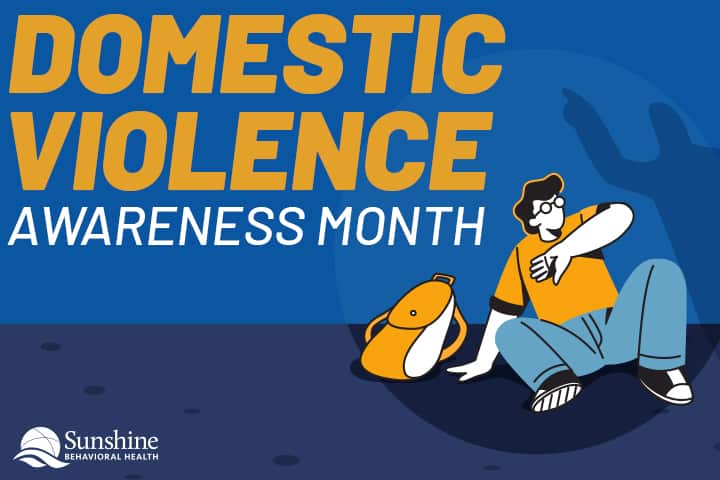
Domestic Violence Awareness Month: Domestic Violence and Substance Abuse
Substance abuse and addiction can create other negative consequences. One is domestic violence.
Domestic Violence and Substance Misuse Statistics
In a 2019 study, researchers in Sweden, United Kingdom, and United States reported that:
- Men who were dependent on alcohol were six times more likely to commit intimate partner violence (IPV), which is violence against a current or former partner.
- Men who were dependent on drugs were seven times more likely to commit intimate partner violence.
Dame Vera Baird, the victims’ commissioner for England and Wales, warned that these statistics don’t tell the full story behind domestic abuse. She noted how people who are abusive while drunk can also be violent while sober and added that many sober people are also violent toward their intimate partners.
Still, such numbers indicate the frightening connection between domestic violence and the misuse of drugs and alcohol.
Domestic Violence and Substance Misuse
Could both be on the rise? Because of the COVID-19 pandemic and fears of disease, more people have spent more time at home.
While at home, people might be
- Anxious about their health and the health of others.
- Lonely because they haven’t been able to meet with loved ones.
- Worried about their finances.
- Bored or frustrated because their lives are different from before.
- Living with a partner who is abusing them physically, verbally, sexually, or emotionally.
People might be using alcohol or drugs to cope with these situations. Or, they might be taking their frustrations out on their partners or children.
The combination of domestic abuse and addiction is common. Studies have shown that substance abuse plays a role in 40 to 60% of all incidents of intimate partner violence.
Treating substance abuse is a good step toward preventing such tragedies. Raising awareness of domestic violence is another.
Domestic Violence Awareness Month
Every October is Domestic Violence Awareness Month (DVAM). This month
- Raises awareness about domestic violence.
- Gives survivors the opportunity to share their stories.
- Provides assistance for people who need it.
- Strives to prevent the problem from happening in the future.
There is no single way to solve domestic violence problems, but there are many people, organizations, and approaches that could help.
NOTE: If domestic violence is affecting you or someone you know, consider contacting the National Domestic Violence Hotline by
- Calling 800-799-SAFE (7233).
- Visiting the site www.thehotline.org and clicking on the site’s chat button.
Sources
cdc.gov – Intimate Partner Violence
journals.plos.org – Mental Disorders and Intimate Partner Violence Perpetrated by Men Toward Women: A Swedish Population-Based Longitudinal Study
bbc.com – Men with Alcohol Problems “Six Times More Likely to Abuse Partner”
sunshinebehavioralhealth.com – Domestic Violence & Substance Abuse
A Message From Our CEO
Medical disclaimer:
Sunshine Behavioral Health strives to help people who are facing substance abuse, addiction, mental health disorders, or a combination of these conditions. It does this by providing compassionate care and evidence-based content that addresses health, treatment, and recovery.
Licensed medical professionals review material we publish on our site. The material is not a substitute for qualified medical diagnoses, treatment, or advice. It should not be used to replace the suggestions of your personal physician or other health care professionals.




